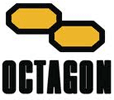Over the past 60 years, Octagon Process has evolved into a global leader in the development of cutting-edge and environmentally sensitive de-icing and anti-icing fluids. Indeed, Octagon was the first to produce Propylene Glycol-based Type II and Type IV fluids in the United States and Octaflo EF was the first new generation, environmentally friendly, Type I fluid to hit the market.
Aircraft de-icing and anti-icing fluids
Every product is developed in Octagon’s laboratories by our technical staff, and are specifically structured to meet our customer’s needs. We provide on-time delivery to any location regardless of weather or road conditions and long-term supply contracts with major Propylene Glycol producers ensures a constant supply to meet your every need. Octagon’s continued leadership through its commitment to excellence, safety and the environment are long-standing hallmarks that have sustained the company for so many years.
Hybrid propylene glycol / non glycol based de-icing fluid
Octagon’s new Type I fluid, EcoFlo, is a hybrid propylene glycol / non glycol based AMS 1424 de-icing fluid. EcoFlo handles and behaves like conventional PG-based deicers, while providing lower BOD5 and COD values.
EcoFlo is ideal for airports looking to reduce municipal wastewater costs by decreasing COD. The combination of lower COD and low aquatic toxicity equate to lower disposal costs for spent fluid.
EcoFlo is the only type I fluid that lowers your BOD5, reduces your carbon footprint, and helps you save money. Benefits include:
- Reduced level of glycol
- 35% lower BOD5
- 25% lower COD
- Low aquatic toxicity
- Excellent surface wetting
- Low foam
- Triazole-free
- No NPE surfactants
Low-toxicity de-icing and anti-icing fluids
Octaflo Type I fluids are the most widely used Type I fluids in North America, and are now being used in Europe and Russia. Octaflo EF (PG based) and Octaflo EG (EG based) utilize the same surfactant system which gives them. Benefits include:
- Superior wetting
- On all aircraft exterior finishes including the new super high gloss paint schemes
- Low aquatic toxicity
Dual use de-icing and anti-icing fluids
Octagon E-Max Type II is a versatile fluid now produced in Europe for our European customers. It is ideal for operators not equipped to use the recommended two-step Type I deicing / Type IV anti-icing process. E-Max is a dual use, anti-icing and de-icing fluid. Benefits include:
- Versatility – E-Max can be used heated and diluted in a one step deicing/anti-icing operation. It can also be used neat, or diluted (as step two) in a two-step process
- Low freezing point – fluid has a low freeze point of -34°C and a lowest operational use of -27°C
- Storage flexibility – can be stored in any clean existing Type II tank at temperatures down to -34°C
Propylene glycol-based de-icing / anti-icing fluids
Octagon Max Flight is the most widely used propylene glycol-based Type IV deicing / anti-icing fluid available. Benefits include:
- Low viscosity – Max flight is delivered with a viscosity from 8,000 – 12,000mPa·s. Generic holdover Table valid from 2920 -14,500 mPa·s. Fluid specific holdover Table valid from 5,540 – 14,500 mPa·s
- Shear Performance – even after a 70% reduction in its maximum viscosity, Max Flight still meets the generic holdover table requirement. Most other Type IV fluids fall out of specification after only moderate shearing
- Superior wetting and coverage – Max Flight’s low viscosity yields superior sprayability and wing coverage, which leads to the potential for considerable cost savings
- No settling or separation – Max Flight will not settle or separate in your tank. This eliminates the need to buy special solvents often needed to clean out your tanks and deicing trucks between seasons
With the lowest on-wing viscosity in the industry, Max Flight is easy to apply. This low viscosity and superior sprayability leads to significant cost savings. Max Flight has been in use for over six years and has had no reported incidents of residual build up during that time.
Environmentally Friendly
Does not contain phenols or Triazoles.
Storage Flexibility
Can be stored in any clean existing Type II or Type IV tank at temperatures down to -34°C.




